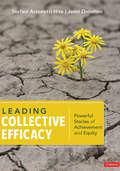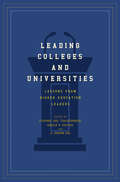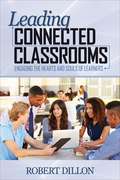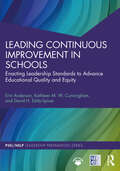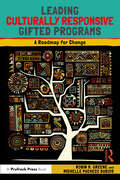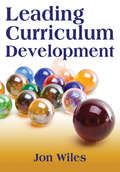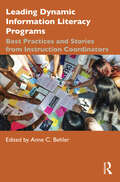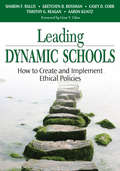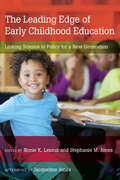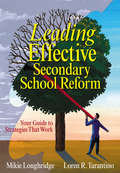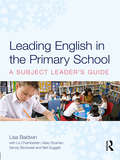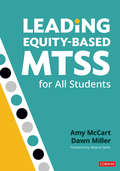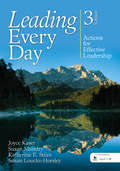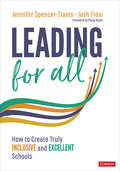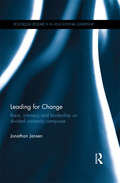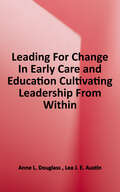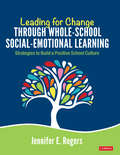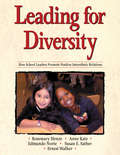- Table View
- List View
Leading Collective Efficacy: Powerful Stories of Achievement and Equity
by Stefani Arzonetti Hite Jenni Anne DonohooInspiration and Guidance to Develop Collective Teacher Efficacy Collective efficacy, or a shared belief that through collective action educators can positively influence student outcomes, has remained at the top of a list of influences on student achievement in John Hattie’s Visible Learning research. Collective efficacy has been embodied by many educators, though collaboration tends to be focused on building community and relationships, which alone are not enough to move the needle on student achievement. This book contains stories of collective efficacy in schools where it has been actualized in practice, and includes: • Real-world case studies of teams who have fostered and sustained collective efficacy • Practical guidance for building collective efficacy through professional learning designs • Tools that can be adapted for specific needs or local contexts Through these accounts, readers will gain a better understanding of ways to capitalize on the reciprocal relationship between student achievement and collective efficacy by having a clear understanding of what collective efficacy looks like and how it can be accomplished.
Leading Collective Efficacy: Powerful Stories of Achievement and Equity
by Stefani Arzonetti Hite Jenni Anne DonohooInspiration and Guidance to Develop Collective Teacher Efficacy Collective efficacy, or a shared belief that through collective action educators can positively influence student outcomes, has remained at the top of a list of influences on student achievement in John Hattie’s Visible Learning research. Collective efficacy has been embodied by many educators, though collaboration tends to be focused on building community and relationships, which alone are not enough to move the needle on student achievement. This book contains stories of collective efficacy in schools where it has been actualized in practice, and includes: • Real-world case studies of teams who have fostered and sustained collective efficacy • Practical guidance for building collective efficacy through professional learning designs • Tools that can be adapted for specific needs or local contexts Through these accounts, readers will gain a better understanding of ways to capitalize on the reciprocal relationship between student achievement and collective efficacy by having a clear understanding of what collective efficacy looks like and how it can be accomplished.
Leading Colleges and Universities: Lessons from Higher Education Leaders
by Edited by Stephen Joel Trachtenberg, Gerald B. Kauvar, and E. Gordon GeeHow experienced college and university leaders guide successful institutions—and why they sometimes lose their way.Today's college and university leaders face complex problems that test their political acumen as well as their judgment, intellect, empathy, and ability to plan and improvise. How do they thoughtfully and creatively rise to the challenge? In Leading Colleges and Universities, editors Stephen Joel Trachtenberg, Gerald B. Kauvar, and E. Gordon Gee bring together a host of presidents and other leaders in higher education who describe how they dealt with the issues.Each contributor has been effective as a president or other significant leader in postsecondary education. In this book they share real-life examples and stories that illustrate how they have dealt with the challenges they encountered. Together they answer these and other core questions:• How do you manage college athletics, faculty, a governing board, donors, and a local community?• What do you need to know about crisis management and legal affairs?• When should you be outspoken in the media and when should you be quiet?The book does not shy away from hot contemporary issues, tackling such controversial matters as free speech, Title IX, athletics, fraternities, student and faculty diversity, and board relations. Presidents and would-be presidents—as well as boards, search committees, state boards, legislators, and others involved in higher education—will find much helpful guidance in this timely book.
Leading Connected Classrooms: Engaging the Hearts and Souls of Learners
by Dr Robert W. DillonHelp your students find and keep the joy in learning! When creative use of technology meets outstanding teaching, incredible learning happens. In this inspiring guide, digital educator and principal Robert Dillon shows readers how to: Use student engagement to promote authentic learning Learn from 16 innovative contributing educators Implement new technology resources and strategies for all classrooms and grade levels Help students build critical thinking skills and gain confidence in their own unique voices
Leading Connected Classrooms: Engaging the Hearts and Souls of Learners
by Dr Robert W. DillonHelp your students find and keep the joy in learning! When creative use of technology meets outstanding teaching, incredible learning happens. In this inspiring guide, digital educator and principal Robert Dillon shows readers how to: Use student engagement to promote authentic learning Learn from 16 innovative contributing educators Implement new technology resources and strategies for all classrooms and grade levels Help students build critical thinking skills and gain confidence in their own unique voices
Leading Continuous Improvement in Schools: Enacting Leadership Standards to Advance Educational Quality and Equity (PSEL/NELP Leadership Preparation)
by Erin Anderson Kathleen M. Cunningham David H. Eddy-SpicerThis volume provides a set of principles and systematic methods for improvement to help district and school leaders achieve the continuous improvement goals embedded in the Professional Standard for Educational Leadership (PSEL) and the National Educational Leadership Program (NELP) standards. Bringing the PSEL Standard 10 to life, this book tackles the why, how, and what of continuous improvement through an equity lens. In the first section, Leading Continuous Improvement in Schools provides an overall introduction to and rationale for continuous improvement, situating current approaches to continuous improvement, situating current approaches to continuous improvement in education within broader historical and sectoral contexts. The second section highlights how the tenets of improvement science – such as making iterative, incremental, evidence-based advancements; utilizing practical measurements; and acknowledging variability – position school and system leaders to adaptively integrate systematic and evidence-based approaches to change as part of ongoing organizational processes. The book concludes with a section that invites readers to consider leadership approaches that forward improvement work, how leaders can build internal capacity to engage in improvement, and how policy can support efforts to build and sustain the capacity for continuous improvement. Special features include beginning-of-chapter highlights, end-of-chapter connections to standards, and action inventories through each chapter. Overall, the volume provides a focus on the continuous improvement aspects of the NELP and PSEL standards that serves as a bridge, supporting students preparing to become educational leaders in their journey from learning about continuous improvement to learning how to lead continuous, equity-oriented improvement work in their own contexts.
Leading Continuous Improvement in Schools: Enacting Leadership Standards to Advance Educational Quality and Equity (PSEL/NELP Leadership Preparation)
by Erin Anderson Kathleen M. Cunningham David H. Eddy-Spicer• Aligns improvement efforts with two sets of standards, NELP and PSEL – no other books in the field do this. • To help ground the main points in this volume, each chapter features a case that presents a leader who is simultaneously leading a school while also learning about improvement science in their graduate class. • To help instructors use this book in their courses, each chapter includes teaching notes and an action inventory aligned to the case examples and chapters. • Uses Improvement Science as a method of continuous change and equity as a values framework—this book centers equity in every improvement effort • This book helps to reframe the conversation about how data can be used by leaders for improvement -- it emphasizes creating a data culture that allows for experimentation and learning from failure and does not limit emphasis on lagging accountability data. • This book is comprehensive with attention to foundational theory and research on continuous improvement, practical methods of continuous improvement, and the leadership of continuous improvement
Leading Culturally Responsive Gifted Programs: A Roadmap for Change
by Robin M. Greene Michelle Pacheco DuBoisWritten by experienced leaders in gifted education, this book is a foundational guide for supervisors, administrators, and districts seeking to create culturally responsive and equity-focused gifted policies and programs. Engaging chapters supported by real-world vignettes and interactive contemplation corners outline key elements of culturally responsive leadership and the administrative actions necessary for disrupting systems of oppression within gifted programs. Topics covered include culturally responsive gifted education, multitiered systems of support, authentic family engagement, the use of data to inform systemic change, and more. Featuring authentic applications of culturally responsive gifted leadership practices and an innovative tool to evaluate gifted program inclusivity, this book is essential reading for all current and future leaders in gifted education.
Leading Curriculum Development
by Dr Jon W. WilesDevelop a curriculum that can transform an ordinary school into a school of excellence! This resource introduces school leaders to dynamic curriculum leadership and a curriculum development process that leads to highly successful school programs. The author demonstrates how administrators can adapt curriculum to meet their school’s changing needs, incorporate emerging technologies, and reflect new and creative ways of thinking about education. The book walks educational leaders through the curriculum development process, showing them how to: Create a school curriculum team Establish a regular curriculum cycle of analysis, design, implementation, and evaluation Develop a path for curriculum improvement
Leading Curriculum Development
by Jon W. WilesDevelop a curriculum that can transform an ordinary school into a school of excellence! This resource introduces school leaders to dynamic curriculum leadership and a curriculum development process that leads to highly successful school programs. The author demonstrates how administrators can adapt curriculum to meet their school’s changing needs, incorporate emerging technologies, and reflect new and creative ways of thinking about education.
Leading Dynamic Information Literacy Programs: Best Practices and Stories from Instruction Coordinators
by Anne C. BehlerLeading Dynamic Information Literacy Programs delves into the library instruction coordinator’s work. Each chapter is written by practicing coordinators, who share their experiences leading information literacy programs that are nimble, responsive, and supportive of student learning. The volume discusses the work of instruction coordinators within five thematic areas: Claiming our Space: Library Instruction in the Landscape of Higher Education; Moving and Growing Together; Curriculum Development; Meaningful Assessment; and Leading Change. Readers will gain insight from their colleagues’ advice for situating information literacy within the higher education institution, developing meaningful curricula, and using assessment in productive ways. Many of the stories represent a departure from traditional models of library instruction. In addition, this book is sure to spark inspiration for innovative approaches to program leadership and development, including strategies for growing communities of practice. From leadership skills and techniques, methods for cultivating shared values, pedagogical approaches, team building, assessment strategies – and everything in between – the aspiring or practicing instruction coordinator has much to gain from reading this work.
Leading Dynamic Schools: How to Create and Implement Ethical Policies
by Sharon F Rallis Gretchen B. Rossman Casey D. Cobb Timothy G. Reagan Dr Aaron M. KuntzA practical guide for creating, implementing, and evaluating school policy. This invaluable resource brings to life the process of making and enacting educational policy. The authors present a conceptual framework for developing effective and ethical school policies and help educational leaders evaluate, interpret, and analyze the regulations that govern their schools. Organized by key topics such as English Language Learners, inclusion, and bullying, the text incorporates vignettes, research, and relevant theories to illustrate how readers can: Create a dialogue that represents the needs of all stakeholders Define relevant policies that are ethically sound Integrate legally mandated policies with schoolwide resolutions
The Leading Edge of Early Childhood Education: Linking Science to Policy for a New Generation
by Jacqueline JonesThe Leading Edge of Early Childhood Education aims to support the effort to simultaneously scale up and improve the quality of early childhood education by bringing together relevant insights from emerging research to provide guidance for this critical, fledgling field. It reflects the growing recognition that early childhood experiences have a powerful effect on children&’s later academic achievement and long-term life outcomes. Editors Nonie K. Lesaux and Stephanie M. Jones bring together an impressive array of scholarly contributors. Topics include: · creating learning environments that support children&’s cognitive and emotional development; · identifying and addressing early risk factors; · using data to guide educators&’ practice; and · capitalizing on the use of technology. Recent years have seen a surge of local, state, and national initiatives aimed at expanding and improving early childhood initiatives, particularly regarding access to preK programs. The Leading Edge of Early Childhood Education promises to be a valuable resource for those charged with enacting the next level of work in this critical area.
Leading Effective Secondary School Reform: Your Guide to Strategies That Work
by Mary E. Loughridge Loren R. TarantinoWith this easy-to-use leadership resource, you'll find successful strategies with case studies and sample agendas to help the school change process run smoothly.
Leading English in the Primary School: A Subject Leader's Guide
by Lisa BaldwinLeading English in the Primary School is a comprehensive guide for both aspiring and experienced leaders of primary English. It supports you in navigating your way through the role and offers practical guidance to help you develop a clear understanding of how to improve the teaching of English in your school. Written by experts with extensive experience of both leadership and the primary classroom, it explores skills required for effective subject leadership while continually considering the specific implications for English. With action and reflection points throughout the book, it offers a detailed introduction to: the role of the English subject leader implementing strategy and vision adapting to new educational policy methods for leading teaching and learning how and why leaders evaluate and monitor progress contemporary changes to the curriculum. Rich case studies reveal how schools lead English in practice and provide real-life examples of English subject leaders’ decision-making processes and actions. Grounding the subject leader role in the current curriculum, Leading English in the Primary School is a source of advice, support and inspiration for all professionals embracing the complex, challenging, yet fulfilling role of Primary English Leader.
Leading Equity-Based MTSS for All Students
by Amy McCart Dr. Dawn Dee MillerEnsure that Every Child Achieves Academic and Social Success An equity-based multi-tiered system of support (MTSS) helps school teams engage all students across the full range of learning needs. MTSS ensures that the vision of equity for every student is achieved, with high expectations and quality instruction, while not straining a school&’s budget or personnel. This strategy filled book teaches you how to • Engage all students in learning through an equity-based approach • Analyze and utilize your resources • Apply strengths- and evidence-based principles for implementation • Incorporate effective tools to systematize MTSS
Leading Equity-Based MTSS for All Students
by Amy McCart Dr. Dawn Dee MillerEnsure that Every Child Achieves Academic and Social Success An equity-based multi-tiered system of support (MTSS) helps school teams engage all students across the full range of learning needs. MTSS ensures that the vision of equity for every student is achieved, with high expectations and quality instruction, while not straining a school&’s budget or personnel. This strategy filled book teaches you how to • Engage all students in learning through an equity-based approach • Analyze and utilize your resources • Apply strengths- and evidence-based principles for implementation • Incorporate effective tools to systematize MTSS
Leading Every Day: Actions for Effective Leadership
by Dr Joyce S. Kaser Ms Susan E. Mundry Katherine E. Stiles Susan Loucks-HorsleyYour shortcut to success for inspired school leadership! Tap your greatest leadership potential and quickly get on track to meeting today’s complicated challenges with this follow up to the best-selling Learning Forward Book of the Year. Newly updated and revised, these short, inspiration-infused nuggets of actionable advice provide a path to effective leadership for all. New features include: Newly added Book 5, focused on solid data systems and achievable results Over 150 convenient, closely integrated daily contemplations to carry anywhere Succinct, up-to-date research for creative solutions to leadership challenges, change, and professional development Updated references and quotes
Leading for All: How to Create Truly Inclusive and Excellent Schools
by Jennifer Spencer-Iiams Josh FlosiDevelop inclusive and equitable school communities where all learners thrive Research has shown that inclusive education results in better academic outcomes for ALL students, not just those identified with disabilities, by promoting self-efficacy, improving social and emotional health, and consistently implementing research-based instructional strategies. Still, many schools rely on deeply ingrained, segregated practices that fail to serve all students. Leading for All is a practical guide that provides a clear pathway for educators to develop a more inclusive school community from start to finish. Authors Jennifer Spencer-Iiams and Josh Flosi share lessons learned from spending nearly a decade building district schools where all students are served in their neighborhood school and in classrooms with their general education peers. Features include: Three focus areas to guide change: Creating Inclusive Cultures, Improving Instructional Practices, and Increasing Student Voice 7 Components of Inclusive and Equitable Learning Communities Supporting resources for promoting inclusion throughout the school day, including co-curricular activities and transportation Stories of real students and teachers and the actions that impacted their success Educators and school leaders want to create inclusive and excellent educational experiences for all students, but they do not always know how to proceed. Leading for All provides a model, stories, strategies, and clear evidence that it can be done effectively.
Leading for All: How to Create Truly Inclusive and Excellent Schools
by Jennifer Spencer-Iiams Josh FlosiDevelop inclusive and equitable school communities where all learners thrive Research has shown that inclusive education results in better academic outcomes for ALL students, not just those identified with disabilities, by promoting self-efficacy, improving social and emotional health, and consistently implementing research-based instructional strategies. Still, many schools rely on deeply ingrained, segregated practices that fail to serve all students. Leading for All is a practical guide that provides a clear pathway for educators to develop a more inclusive school community from start to finish. Authors Jennifer Spencer-Iiams and Josh Flosi share lessons learned from spending nearly a decade building district schools where all students are served in their neighborhood school and in classrooms with their general education peers. Features include: Three focus areas to guide change: Creating Inclusive Cultures, Improving Instructional Practices, and Increasing Student Voice 7 Components of Inclusive and Equitable Learning Communities Supporting resources for promoting inclusion throughout the school day, including co-curricular activities and transportation Stories of real students and teachers and the actions that impacted their success Educators and school leaders want to create inclusive and excellent educational experiences for all students, but they do not always know how to proceed. Leading for All provides a model, stories, strategies, and clear evidence that it can be done effectively.
Leading for Change: Race, intimacy and leadership on divided university campuses (Routledge Research in Educational Leadership)
by Jonathan JansenThis book offers new theoretical ground for thinking about, and transforming, leadership and higher education worldwide. Through an examination of the construct of intimacy and ‘nearness’, including emotional, spiritual, psychic, intellectual, and physical closeness, Jonathan Jansen demonstrates its power to influence positive leadership in young people. He argues that sensory leadership, which includes but extends beyond the power of touch, represents a fresh and effective approach to progressive transformation of long divided institutions. Considering richly textured narratives, chapters explore complex intimacies among Black and White university students in South Africa, post-apartheid and in the aftermath of a major racial atrocity. The stories reveal the students’ transformation in the process of ‘leadership for change’, interweaving concepts of racism, human relationships and intimacy, and in turn expanding the knowledge base of social and institutional improvement. This book explores how, when different kinds of nearness come together in leadership change, young people respond in ways that would not be possible through conventional instruments such as policy, legislation and the appeal to moral sensibilities alone. Leading for Change will be critical reading for academics, researchers and postgraduate students in the fields of education, educational justice, higher education, educational leadership and change, social and/or racial justice. This book will also be of interest to those working in the fields of anthropology, social psychology, and South African contemporary politics, policy and institutional practices.
Leading for Change in Early Care and Education: Cultivating Leadership from Within (Early Childhood Education Ser.)
by Anne L. DouglassFeaturing both research findings and practical recommendations, this book presents an innovative framework for nurturing leadership in the care and education of young children. Early educators are often seen as the objects of change, rather than the architects and co-creators of change. Douglass calls for a paradigm shift in thinking that challenges many long-held stereotypes about the early care and education workforce's capacity to lead change. Case studies show how educators use their expertise every day to make a difference in the lives of children and families. These accounts demonstrate concrete strategies for expanding current thinking about who can be leaders for change and for developing more inclusive pathways for leadership. This book has the potential to revolutionize the field with a new model for developing and nurturing innovative, entrepreneurial, and skilled early educator leaders capable of driving transformative change-from classrooms and home-based programs to communities and beyond. Includes a cross-disciplinary examination of leadership, improvement, and innovation, a framework for building ecosystems that supports professional growth and teacher retention, case studies that reveal immense untapped potential from within the early care and education workforce, and a critical look at the current state of leadership and quality improvement in early childhood education.
Leading for Change Through Whole-School Social-Emotional Learning: Strategies to Build a Positive School Culture
by Dr. Jennifer E RogersDevelop and cultivate social-emotional learning to create a new school climate! As research on the positive outcomes of Social Emotional Learning (SEL) are emerging, schools and districts across the country are adopting the practices and processes to improve student outcomes and teacher capacity. The real-world experiences and evidence-based strategies outlined in this book will guide implementation of a practical and sustainable social emotional learning program. In addition to an integrated workbook readers will find: recommendations for steps with each strategy in an implementation rubric reflection questions to promote deeper thinking on SEL resources to explore at the end of each chapter
Leading for Change Through Whole-School Social-Emotional Learning: Strategies to Build a Positive School Culture
by Dr. Jennifer E RogersDevelop and cultivate social-emotional learning to create a new school climate! As research on the positive outcomes of Social Emotional Learning (SEL) are emerging, schools and districts across the country are adopting the practices and processes to improve student outcomes and teacher capacity. The real-world experiences and evidence-based strategies outlined in this book will guide implementation of a practical and sustainable social emotional learning program. In addition to an integrated workbook readers will find: recommendations for steps with each strategy in an implementation rubric reflection questions to promote deeper thinking on SEL resources to explore at the end of each chapter
Leading for Diversity: How School Leaders Promote Positive Interethnic Relations
by Rosemary C. Henze Mr Edmundo Norte Dr Susan E. Sather Ernest Walker Dr Anne KatzThe authors provide powerful models of leadership that are effective in developing schools where positive interethnic relations can flourish.
